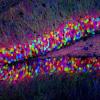I'm always surprised curcumin doesn't receive as much attention on the Brain Health forum as it does elsewhere here. It's certainly becoming one of the more well-studied nutritional supplements, and it affects many of the factors that people here target through other means: BDNF, dopamine modulation, cognitive protection against stress, working through cAMP, heavy metal chelation, anti-inflammatory effects, etc.
http://www.ncbi.nlm....les/PMC2929771/ provides a summary of curcumin's studied effects on depression, tardive dyskinesia and diabetic neuropathy.
An Overview of Curcumin in Neurological Disorders
S. K. Kulkarni* and A. Dhir1
Abstract
Curcumin, the principal curcuminoid found in spice turmeric, has recently been studied for its active role in the treatment of various central nervous system disorders. Curcumin demonstrates neuroprotective action in Alzheimer's disease, tardive dyskinesia, major depression, epilepsy, and other related neurodegenerative and neuropsychiatric disorders. The mechanism of its neuroprotective action is not completely understood. However, it has been hypothesized to act majorly through its anti-inflammatory and antioxidant properties. Also, it is a potent inhibitor of reactive astrocyte expression and thus prevents cell death. Curcumin also modulates various neurotransmitter levels in the brain. The present review attempts to discuss some of the potential protective role of curcumin in animal models of major depression, tardive dyskinesia and diabetic neuropathy. These studies call for well planned clinical studies on curcumin for its potential use in neurological disorders.
http://www.jbiomedsc...content/17/1/43 shows evidence of curcumin modulating dopamine in a diabetic rat model.
Curcumin modulates dopaminergic receptor, CREB and phospholipase c gene expression in the cerebral cortex and cerebellum of streptozotocin induced diabetic rats
T Peeyush Kumar, Sherin Antony, G Gireesh, Naijil George and CS Paulose*
- *Corresponding author: CS Paulose biomncb@cusat.ac.in
Molecular Neurobiology and Cell Biology Unit, Centre for Neuroscience, Cochin University of Science and Technology, Cochin- 682 022, Kerala, India
For all author emails, please log on.
Journal of Biomedical Science 2010, 17:43 doi:10.1186/1423-0127-17-43
Abstract
Curcumin, an active principle component in rhizome of Curcuma longa, has proved its merit for diabetes through its anti-oxidative and anti-inflammatory properties. This study aims at evaluating the effect of curcumin in modulating the altered dopaminergic receptors, CREB and phospholipase C in the cerebral cortex and cerebellum of STZ induced diabetic rats. Radioreceptor binding assays and gene expression was done in the cerebral cortex and cerebellum of male Wistar rats using specific ligands and probes. Total dopaminergic receptor binding parameter, Bmax showed an increase in cerebral cortex and decrease in the cerebellum of diabetic rats. Gene expression studies using real time PCR showed an increased expression of dopamine D1 and D2 receptor in the cerebral cortex of diabetic rats. In cerebellum dopamine D1 receptor was down regulated and D2 receptor showed an up regulation. Transcription factor CREB and phospholipase C showed a significant down regulation in cerebral cortex and cerebellum of diabetic rats. We report that curcumin supplementation reduces diabetes induced alteration of dopamine D1, D2 receptors, transcription factor CREB and phospholipase C to near control. Our results indicate that curcumin has a potential to regulate diabetes induced malfunctions of dopaminergic signalling, CREB and Phospholipase C expression in cerebral cortex and cerebellum and thereby improving the cognitive and emotional functions associated with these regions. Furthermore, in line with these studies an interaction between curcumin and dopaminergic receptors, CREB and phospholipase C is suggested, which attenuates the cortical and cerebellar dysfunction in diabetes. These results suggest that curcumin holds promise as an agent to prevent or treat CNS complications in diabetes.
According to early research from UCLA, curcumin coupled with vitamin D may help clear amyloid beta implicated in Alzheimer's: http://www.scienceda...90715131558.htm
http://www.ncbi.nlm....pubmed/19879308 An in-vitro study on rat neurons found BDNF activation:
Curcumin produces neuroprotective effects via activating brain-derived neurotrophic factor/TrkB-dependent MAPK and PI-3K cascades in rodent cortical neurons.
Wang R, Li YH, Xu Y, Li YB, Wu HL, Guo H, Zhang JZ, Zhang JJ, Pan XY, Li XJ.
Source
State Key Laboratory of Natural Biomimetic Drugs, Department of Pharmacology, School of Basic Medical Sciences, Peking University, Beijing, China.
Abstract
Curcumin is a major constituent of curcuma longa, a traditional medicine used to manage mental disorders effectively in China. The neuroprotective effects of curcumin have been demonstrated in our previous studies. In the present research, we confirmed this effect by showing that curcumin application promoted the viability of cultured rodent cortical neurons. Moreover, when neurons were pretreated with tyrosine kinase B (TrkB) antibody, known to inhibit the activity of brain-derived neurotrophic factor (BDNF), the protective effect of curcumin was blocked. Additionally, treatment of curcumin increased BDNF and phosphor-TrkB and both of these enhancements can be suppressed by ERK and PI-3K inhibitors. The administration of curcumin led to increased levels of phosphor-ERK and AKT, which were each blocked by MAPK and PI-3K inhibitors. Furthermore, the curcumin-induced increase in phosphorylated cyclic AMP response element binding protein (CREB), which has been implicated as a possible mediator of antidepressant actions, was prevented by MAPK and PI-3K inhibitors. Therefore, we hypothesize the neuroprotection of curcumin might be mediated via BDNF/TrkB-MAPK/PI-3K-CREB signaling pathway.
Copyright 2009. Published by Elsevier Inc.
PMID: 19879308 [PubMed - indexed for MEDLINE]
http://www.annalsofi...9;aulast=Mishra discusses an overview of curcumin's inhibitory effects on Alzheimer's.
The effect of curcumin (turmeric) on Alzheimer's disease: An overview
Shrikant Mishra, Kalpana Palanivelu
Department of Neurology, VA/ USC 16111, Sepulveda, CA, USA
Date of Submission 04-Nov-2007 Date of Decision 05-Feb-2008 Date of Acceptance 14-Feb-2008
Correspondence Address:
Shrikant Mishra
Department of Neurology, VA/ USC 16111, Plummer Street, Sepulveda, CA, 91343
USA
OI: 10.4103/0972-2327.40220
PMID: 19966973
This paper discusses the effects of curcumin on patients with Alzheimer's disease (AD). Curcumin (Turmeric), an ancient Indian herb used in curry powder, has been extensively studied in modern medicine and Indian systems of medicine for the treatment of various medical conditions, including cystic fibrosis, haemorrhoids, gastric ulcer, colon cancer, breast cancer, atherosclerosis, liver diseases and arthritis. It has been used in various types of treatments for dementia and traumatic brain injury. Curcumin also has a potential role in the prevention and treatment of AD. Curcumin as an antioxidant, anti-inflammatory and lipophilic action improves the cognitive functions in patients with AD. A growing body of evidence indicates that oxidative stress, free radicals, beta amyloid, cerebral deregulation caused by bio-metal toxicity and abnormal inflammatory reactions contribute to the key event in Alzheimer's disease pathology. Due to various effects of curcumin, such as decreased Beta-amyloid plaques, delayed degradation of neurons, metal-chelation, anti-inflammatory, antioxidant and decreased microglia formation, the overall memory in patients with AD has improved. This paper reviews the various mechanisms of actions of curcumin in AD and pathology.
http://www.ncbi.nlm....pubmed/15590663 shows evidence of BBB crossing and amyloid plaque reduction in injected rats:
Curcumin inhibits formation of amyloid beta oligomers and fibrils, binds plaques, and reduces amyloid in vivo.
Yang F, Lim GP, Begum AN, Ubeda OJ, Simmons MR, Ambegaokar SS, Chen PP, Kayed R, Glabe CG, Frautschy SA, Cole GM.
Source
Department of Medicine, UCLA, Los Angeles, CA 90095, USA.
Abstract
Alzheimer's disease (AD) involves amyloid beta (Abeta) accumulation, oxidative damage, and inflammation, and risk is reduced with increased antioxidant and anti-inflammatory consumption. The phenolic yellow curry pigment curcumin has potent anti-inflammatory and antioxidant activities and can suppress oxidative damage, inflammation, cognitive deficits, and amyloid accumulation. Since the molecular structure of curcumin suggested potential Abeta binding, we investigated whether its efficacy in AD models could be explained by effects on Abeta aggregation. Under aggregating conditions in vitro, curcumin inhibited aggregation (IC(50) = 0.8 microM) as well as disaggregated fibrillar Abeta40 (IC(50) = 1 microM), indicating favorable stoichiometry for inhibition. Curcumin was a better Abeta40 aggregation inhibitor than ibuprofen and naproxen, and prevented Abeta42 oligomer formation and toxicity between 0.1 and 1.0 microM. Under EM, curcumin decreased dose dependently Abeta fibril formation beginning with 0.125 microM. The effects of curcumin did not depend on Abeta sequence but on fibril-related conformation. AD and Tg2576 mice brain sections incubated with curcumin revealed preferential labeling of amyloid plaques. In vivo studies showed that curcumin injected peripherally into aged Tg mice crossed the blood-brain barrier and bound plaques. When fed to aged Tg2576 mice with advanced amyloid accumulation, curcumin labeled plaques and reduced amyloid levels and plaque burden. Hence, curcumin directly binds small beta-amyloid species to block aggregation and fibril formation in vitro and in vivo. These data suggest that low dose curcumin effectively disaggregates Abeta as well as prevents fibril and oligomer formation, supporting the rationale for curcumin use in clinical trials preventing or treating AD.
PMID: 15590663 [PubMed - indexed for MEDLINE]
In summary, while there is mounting evidence to support curcumin's use from animal and in-vitro studies, there is still a dearth of direct, well-designed human studies. However, this remains the case for the majority of nootropics discussed on this board, but members of Longecity tend to be more speculative and optimistic of preliminary data than the average person. Thus, curcumin poses merit alongside other supplements like uridine, ALCAR, lion's mane et al. as a long-term cognitive enhancer.
Edited by norepinephrine, 16 April 2013 - 02:43 PM.
























































